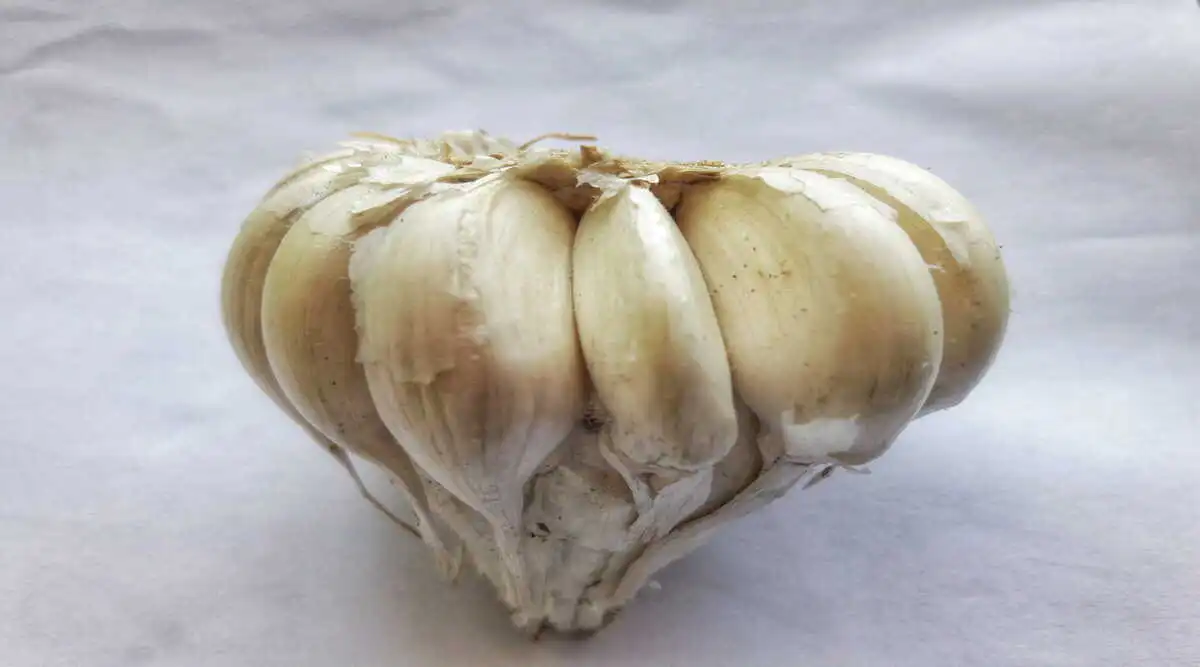Garlic is an ideal plant in gastronomy, an exceptional condiment. It provides various advantages to the body, from the preventive or prophylactic point of view in relation to some pathologies.
In this sense, it maximizes the person’s immune system, and has anti-inflammatory, antiseptic, antibacterial and anti-flu qualities.
In the same way, its consumption favors reducing bad cholesterol and regulating arterial hypertension, among many other advantages.
With all the benefits provided by this plant, it is normal to wonder if its intake can cause uncomfortable ulcers in the mouth. In this article this question will be answered, adding important and relevant information.
Can garlic cause mouth ulcers?
There is no solid scientific evidence to support the claim that garlic causes mouth ulcers also known as canker sores. In fact, garlic has been used for centuries for its medicinal properties and potential health benefits.
It contains compounds with antimicrobial and anti-inflammatory properties that may be beneficial for oral health. However, it’s important to note that some people may have individual sensitivities or allergies to certain foods that have garlic.
In rare cases, some people may experience irritation or an allergic reaction to garlic, which could manifest as mouth ulcers or other oral discomfort.
If you suspect that garlic may be causing ulcers in your mouth, it is advisable to see a doctor for proper evaluation and diagnosis.
He can provide you with effective guidance at identifying the underlying cause of your canker sores and recommend appropriate treatment options.
Garlic properties for mouth ulcers
Although there is no solid evidence that garlic mouth ulcers, garlic does have certain properties that may be beneficial in your treatment.
These are some of the properties of garlic that could have a positive effect on mouth ulcers:
Antimicrobial properties
This plant contains compounds such as allicin, which exhibit antimicrobial activity. These properties can help fight bacteria, viruses, and fungi that can contribute to the development or persistence of mouth ulcers.
Anti-inflammatory properties
Garlic contains sulfur compounds that have anti-inflammatory effects. By reducing inflammation, garlic can help ease discomfort and promote healing.
Immune system support
Garlic has been recognized for its immune system strengthening properties; remember that a strong immune system can aid in the healing of mouth ulcers by fighting underlying infections or promoting the regeneration of damaged tissues.
Nevertheless, it’s important to point out that these potential benefits are primarily based on its general antimicrobial and anti-inflammatory properties. There are no specific studies that have conclusively demonstrated the efficacy of garlic in the treatment of Mouth ulcers.
Garlic-Related compounds and their effects on oral health
Garlic contains several compounds that may have beneficial effects on oral health, including:
- Allicin: It is one of the main bioactive compounds present in garlic. It has antimicrobial properties and can help fight bacteria, viruses and fungi in the oral cavity. This could be beneficial in preventing infection and promoting oral health.
- Sulfur Compounds: This plant contains various sulfur compounds such as allyl disulfide and allyl trisulfide. These compounds have shown antibacterial and antifungal properties, which could help control the growth of harmful microorganisms in the mouth.
- Antioxidants: It is a rich source of antioxidants (sulfur and polyphenols compounds). They help reduce oxidative stress and inflammation in the oral tissues, which could be beneficial for gum health and periodontal disease prevention.
- Anti-inflammatory compounds: Organosulfur compounds have anti-inflammatory properties. These compounds can help reduce inflammation in the mouth, which is important for the treatment and prevention of inflammatory conditions such as swollen gums or gingivitis.
Having said that, research on the specific effects of garlic on oral health is limited, and most studies have been conducted in laboratory settings or on animals.
More clinical research is also needed to better understand how garlic and its compounds may influence human oral health. It is always advisable to consult a health professional before using garlic or its compounds for therapeutic purposes.
Allicin and its antimicrobial properties
This bioactive compound that is formed when garlic is cut, crushed or bitten, has antimicrobial properties that can help fight various bacteria, viruses and fungi.
Here are some of the antimicrobial properties of allicin:
- Antibacterial action.
- Antifungal activity.
- Antiviral effect.
The antimicrobial activity of allicin may depend on several factors, such as the concentration of the compound, the exposure time, and the specific environmental conditions. This is a volatile compound and can lose its activity over time due to degradation.
Organosulfur compounds and their anti-inflammatory effects
In some ways, the organosulfur compounds such as allyl disulfide and allyl trisulfide, have been shown to have anti-inflammatory effects, which can help reduce inflammation in the body, including the oral cavity.
These are some of the anti-inflammatory effects of organosulfur compounds:
- Inhibition of the production of inflammatory mediators.
- Modulation of the immune response.
- Reduction of oxidative stress.
- Modulation of inflammatory signaling pathways.
More research on the specific effects of organosulfur compounds on oral inflammation is needed as well as further studies to better understand the precise mechanisms and efficacy of these compounds regarding on oral health.
Other bioactive compounds in garlic and their potential effects on oral health
In addition to allicin and organosulfur compounds, this plant contains other bioactive compounds that could have beneficial effects on oral health.
Here are some of them:
- S-allylcysteine (SAC).
- Flavonoids.
- Volatile sulfur compounds.
- Vitamins and minerals.
Importantly, research on the specific effects of these garlic compounds on oral health is limited and more scientific evidence is needed to support their benefits.
Interaction of garlic compounds with oral tissues
Garlic compounds can interact with oral tissues in different ways. Here are some potential interactions:
- Irritation.
- Changes in odor and taste.
- Interaction with oral microbiology.
Studies and evidence on garlic and mouth ulcers
Animal studies investigating the effects of garlic on mouth ulcers
Although the evidence in humans is limited, some animal studies have been conducted to investigate the effects of garlic on mouth ulcers.
Some examples of animal studies are mentioned below:
- Studies rats: A study in rats with induced canker sores found that topical application of garlic extract showed significant healing effects. In this sense, an acceleration in the healing of ulcers was observed, as well as a reduction in inflammation and tissue damage.
- Studies in mice: Another study in mice with experimental oral ulcers examined the effects of garlic in combination with honey. The results showed that the combination of garlic and honey had a positive effect on ulcer healing, reducing inflammation and speeding up healing.
These preliminary animal studies suggest that garlic may have healing and anti-inflammatory properties that may be beneficial for mouth ulcers.
However, it is important to note that animal results do not always translate directly to humans, and more clinical research is needed to evaluate the effects of garlic on mouth ulcers in humans.
Allergic Reactions to Garlic and Oral Manifestations
Allergic reactions to garlic can manifest in different ways, including oral symptoms. Among some of the possible oral manifestations of an allergic reaction may include:
- Itchy mouth and throat: You may experience an itchy or irritated sensation in your mouth and throat after consuming garlic if you are allergic to it.
- Swollen lips, tongue or mouth: Swelling of the lips, tongue or mouth is a common symptom of an allergic reaction. It may be accompanied by a burning sensation or numbness in the affected area.
- Redness and rashes around the mouth: The skin around the mouth may show redness, irritation, or rashes after exposure to garlic if you have an allergy.
- Mouth ulcers: In more serious cases, an allergic reaction to garlic can trigger the formation of mouth ulcers, these ulcers can be painful and affect the oral mucosa.
It is important to note that the symptoms and severity of allergic reactions to garlic can vary from person to person. If you experience any of these symptoms after consuming garlic or suspect a garlic allergy, it is essential to seek medical attention for proper evaluation.
In this situation, a doctor or allergist can perform appropriate allergy testing to confirm sensitivity to garlic and provide specific recommendations on garlic consumption and treatment.
Garlic allergy: prevalence and symptoms
The prevalence of garlic allergy varies by population and geographic region, but in general, it is considered relatively low compared to other common food allergies.
Garlic allergy is estimated to affect less than 1% of the general population. Garlic allergy symptoms can vary in severity and may include:
- Oral symptoms: Itching, burning, or swelling in the mouth, lips, tongue, or throat after exposure to garlic.
- Skin symptoms: Rashes, redness, hives (hives), or swelling around the mouth or on other parts of the body.
- Respiratory symptoms: Nasal congestion, sneezing, runny nose, coughing, or shortness of breath.
- Gastrointestinal symptoms: Abdominal pain, nausea, vomiting or diarrhea.
- Serious systemic symptoms: In rare but serious cases, an allergic reaction to garlic can trigger anaphylaxis, a life-threatening allergic reaction that can include difficulty breathing, throat swelling, dizziness, fainting, and shock.
The symptoms may vary from person to person and the severity of the allergy may be different in each case. Some people may experience a mild allergy to garlic with mild, localized symptoms, while others may have more severe reactions.
If garlic affects you in some way, avoid consumption and be aware of foods and products that may contain garlic as a hidden ingredient.
Relationship between garlic allergy and mouth ulcers
A direct relationship between garlic allergy and mouth ulcers has not been established. They are painful lesions on the mucosa of the mouth that can be caused by various factors, such as injuries, infections, nutritional deficiencies, stress, or autoimmune diseases.
Garlic allergy, on the other hand, is an abnormal immune response to components of garlic such as proteins. Garlic allergy symptoms can include itching, swelling, rashes, shortness of breath, and other allergic symptoms.
While it is possible that a person allergic to garlic could experience oral irritation or inflammation after exposure to garlic, this is not specifically considered a mouth ulcer.
Mouth ulcers are usually separate lesions and are not directly associated with food allergy.
Personal Experiences and Case Studies
Allergic reactions to garlic are possible, although relatively rare. When they occur, they can manifest in a number of ways, including oral manifestations.
Some of the symptoms of an allergic reaction to garlic that can affect the mouth include:
Irritation and itching
After coming into contact with garlic, some people may experience irritation of the mouth, lips, tongue or gums. This can manifest as an itching, burning or swollen sensation in the areas.
Inflammation of oral tissues
In more serious cases, an allergic reaction to garlic can cause significant inflammation of the oral tissues, which can include swelling of the lips, tongue, gums, or roof of the mouth, which can make breathing or swallowing difficult.
Hives
Some people can develop oral hives after consuming garlic. This manifests as small red bumps or hives in the mouth, which can be painful or itchy.
Angioedema
In rare cases, a severe allergic reaction to garlic can cause angioedema, which is deep tissue swelling, which can affect the mouth and throat, and may result in difficulty breathing or swallowing.
It is important to note that each person may react differently to allergenic substances, and symptoms may vary in severity. If you experience any allergic reaction after consuming garlic, it is important to seek medical attention immediately. If you have prior knowledge of an allergy to garlic or suspect that you might be allergic to it, it is advisable to avoid its consumption.
Individuals’ accounts of mouth ulcers triggered by garlic consumption
Some people have reported experiencing canker sores or oral irritation after consuming garlic, which can vary in severity and duration.
Therefore, the following are some examples of the reports of individuals that claimed mouth ulcers sprouted by the consumption of garlic:
- Recurring canker sores: Some people have reported developing recurrent canker sores after consuming garlic. These can appear on the tongue, gums, or cheeks, and can be painful and take several days or weeks to heal.
- Burning sensation or irritation: Some individuals have experienced a burning sensation or irritation in the mouth after eating raw or cooked garlic. This feeling may be temporary and go away after a while, or it may persist for several hours.
- Increased sensitivity: Some people have noted increased sensitivity of the oral tissues after consuming garlic, which may manifest as a burning sensation or pain when touching or chewing food.
It is important to note that these accounts are based on individual experiences and can vary from person to person. Not everyone will experience canker sores or oral irritation after consuming garlic. In addition, the form of garlic consumption (raw, cooked, powder, supplement) and individual sensitivity can influence the oral response to garlic.
Insights from healthcare professionals
Health professionals’ perspectives on garlic consumption and its relationship to mouth ulcers may vary. some may take a more cautious stance and emphasize the lack of solid scientific evidence to support the benefits of garlic for treatment.
Others may recognize that garlic has antimicrobial and anti-inflammatory properties and consider using it as an adjunct treating mouth ulcers, even though there is no definitive evidence base.
Dentists, physicians, and nutritionists, often base their recommendations on available scientific evidence, as well as their clinical experience and professional knowledge.
Due to the lack of rigorous clinical studies on garlic and mouth ulcers, some may be wary of endorsing its use as a primary treatment.
Overall, it is advisable to speak with a dentist or doctor to get a proper evaluation and get specific guidance based on your individual situation.
In this sense, they will be able to provide information based on evidence and personalized recommendations based on your medical history, symptoms and individual needs.
FAQs
There are no specific foods that have been scientifically proven to increase ulcers, but the ideal is to avoid: spicy, acidic, hard or crunchy foods, and those that are hot, whether liquid or solid.
To some people, raw garlic can cause irritation to the tongue as it contains bioactive compounds such as allicin, which can have irritating properties to certain mucous membranes, including the tongue.
The time it takes for garlic to show results in relieving canker sores can vary depending on the person and the severity of the ulcers.
Although garlic is commonly considered safe to consume, there are potential side effects and risks associated with its use for mouth ulcers, it is important to be aware of these aspects and exercise caution, to avoid allergic reactions, stomach ache, irritations, discomfort , or interaction with some medications that you have for medical treatment.
Conclusion
Generally, there is no scientific evidence that certifies that garlic can cause mouth ulcers. On the contrary, it has properties that are beneficial for oral health.
However, it is important to consider that some people may have individual sensitivities or allergies to this plant. Garlic has certain properties that could be beneficial for mouth ulcers, among which we can mention:
- Antimicrobial properties (Its properties can help fight bacteria, viruses and fungi that can contribute to the development or persistence of mouth ulcers),
- Anti-inflammatory properties (Its compounds can reduce inflammation, relieve discomfort and promote the healing of canker sores),
- Immune system support (it can fight underlying infections or promote regeneration of damaged tissues).
The potential benefits of garlic for mouth ulcers are primarily based on its general antimicrobial and anti-inflammatory properties. It can be combined with honey, to take advantage of the qualities of this food, and be more effective in the treatment of ulcers.
Although there are no specific studies that have conclusively demonstrated the efficacy of garlic in the treatment of ulcers, it is generally used for this type of condition.
On the other hand, remember that if you have persistent or severe mouth ulcers, go see a doctor for an accurate diagnosis.

A. Neomar Evies es un profesor graduado y licenciado en informática. Investigador y conferencista que ha participado en diferentes eventos en diversos países. Tiene amplia experiencia en el campo de la gestión deportiva y el deporte de alto rendimiento y salud deportiva del atleta. También tiene un doctorado en Ciencias del Deporte y un Máster en administración. Como escritor ha escrito tres libros sobre sistemas de información centrados en Gestión y Deportes.





